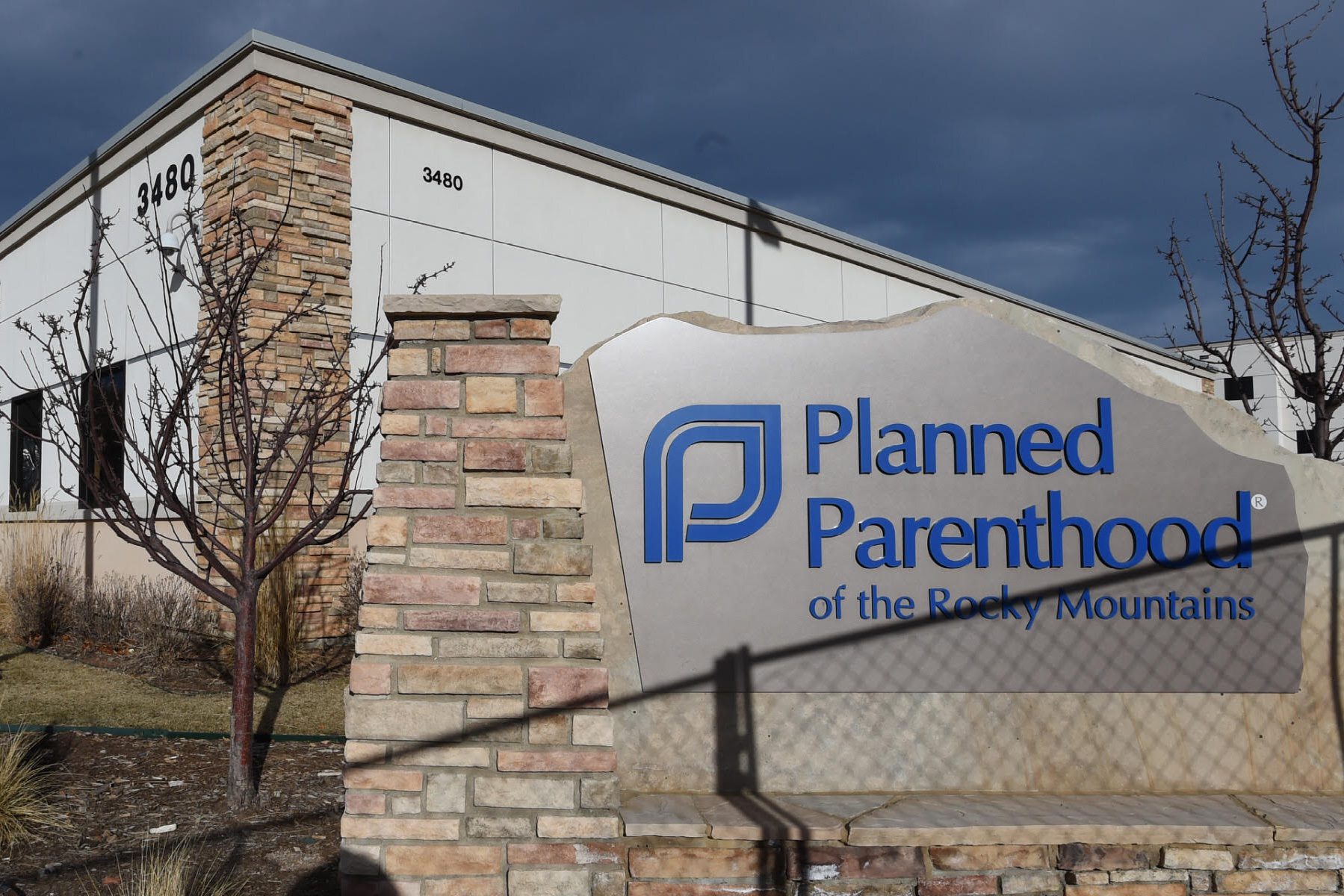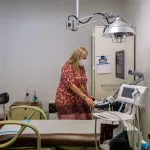With the vast majority of abortions now illegal in Texas, clinics in nearby states are already reporting increases in demand as patients prepare to travel hundreds of miles to safely, legally terminate a pregnancy.
The Texas ban prohibits abortions after six weeks of pregnancy, a point at which few people realize they’ve conceived and before most abortions take place. Clinics in Texas have stopped scheduling abortion-related visits for people who are more than six weeks pregnant.
As a result, clinics in Colorado, Oklahoma, Kansas and New Mexico are either expecting or are already starting to receive calls from Texas-based patients now forced to leave the state to end their pregnancies — likely stretching those clinics’ already thin resources. Many patients will travel hundreds of miles: The law has increased the average one-way driving distance for a Texan seeking an abortion from 12 miles to 248, per analyses by the Guttmacher Institute, which tracks reproductive health policy. The law also adds to the likelihood that someone traveling for care would need to find overnight lodging, potentially adding an additional cost.
Neighboring Louisiana has strict restrictions on the procedure, and many clinics are without power in the wake of Hurricane Ida. Abortion funds — which provide money for people who cannot afford an abortion or don’t have the resources to travel — are also preparing for increased demand.
“We’re planning on a large increase [in calls] starting late this week and next week,” said Joan Lamunyon Sanford, who heads the New Mexico Religious Coalition for Reproductive Choice, which provides financial support for people who travel to the state for abortions. “We are doing very assertive targeted fundraising, so that we have the resources we need. We’ve never had to turn anyone down because of finances, and we don’t want to have to do that.”
But the often-fragile abortion clinic infrastructure in neighboring states probably will not be able to care for all of them. Many clinics and providers are already fully booked just caring for the people who live in their states, and abortion funds are already struggling to support everyone who seeks their aid. Providers and advocates worry that people with lower incomes and greater distances to travel will ultimately fall through the cracks, leading them to carry unwanted pregnancies to term or attempt to terminate their pregnancies at home, which is often dangerous.
Still, providers say they expect the surge in demand, already evident, to grow even further.
Trust Women, an abortion-providing clinic with outposts in both Oklahoma City and Wichita, is already seeing the effect. They started fielding calls from Texas-based patients even before the six-week ban took effect. The Oklahoma City-based clinic, which is more than 100 miles from the state’s border with Texas, had, as of August 31, already scheduled abortion-related visits for about 40 people from Texas, according to spokesperson Zack Gingrich-Gaylord.
Trust Women’s Wichita-based clinic, which is almost 300 miles north of the Texas border, has begun scheduling visits as well, with about 10 already booked by August 31. Typically Oklahoma City and Wichita provide abortions for some Texans, but those are significant increases over the norm, Gingrich-Gaylord said.
The Wichita clinic is also planning construction so that it can permanently expand how many patients it sees, in anticipation of increased patients from out of state, said Ashley Brink, the Wichita clinic’s director.
“We are already booking Texas patients through the end of September,” Gingrich-Gaylord said. “We’ll obviously continue to try to add more capacity, but it’s already a sign of the coming wave that we’re looking that far out.”
Neither Trust Women nor other clinics in those neighboring states felt confident projecting how much they expect demand to increase. Though other states have passed six-week abortion bans, Texas is the only one where one has actually taken effect. Lamunyon Sanford said she expected requests for financial aid to double — at least.
The closest analogue for the ban comes from March 2020, when Texas Gov. Greg Abbott issued an order banning abortions in the state — an effort, he said, to preserve medical resources during the the COVID-19 emergency. The order was heavily criticized by medical experts, who noted that abortion is a time-sensitive procedure and said maintaining reproductive health services wouldn’t necessary divert resources. It was lifted by the end of April.
In that timespan, clinics across Texas’ neighboring states reported massive increases in out-of-state patients coming in to seek abortion care — even more so after Oklahoma’s governor also initiated a temporary abortion shutdown.
Research published in the Journal of the American Medical Association shows that in that time, abortions performed for Texans dropped by almost 40 percent — indicating that many people who otherwise would have sought the procedure could not get one. At the same time, the same study found, the number of Texans getting out-of-state care jumped from 157 people in February 2020 to 947 that April.
“That’s really terrifying to think the closest we can compare this to is a once-in-a-hundred-year pandemic that’s still ongoing,” Gingrich-Gaylord said.
Trust Women’s Wichita clinic alone saw 203 Texas-based patients from March to May of 2020. Planned Parenthood of the Rocky Mountains, which serves Colorado, New Mexico, southern Nevada and Wyoming, reported a 12-fold increase in the number of Texas patients that spring. Officials there expect the number to be even higher this time — and for the increase to be permanent.
“We’ll see even greater numbers,” said Adrienne Mansanares, the chief experience officer for Planned Parenthood of the Rocky Mountains. “In that April surge, we had our parking lots of our health centers in Albuquerque literally full with Texas license plates the morning we opened up [after the Texas ban took effect]. It’s very visual and it’s emotionally draining.”
Planned Parenthood of the Rocky Mountains is already working to hire more providers who can perform abortions and to partner with local health departments and federally funded clinics that may be able to take on responsibilities that do not involve abortion. Texas-based patients are already booking appointments at Rocky Mountain-based affiliates, she added.
The Texas law allows private citizens to sue anyone who “aids and abets” a person in getting an abortion after six weeks of pregnancy. The statute is vague, but many providers told The 19th they do not believe it applies if the aid enables someone to get an abortion after six weeks outside of the state of Texas.
Texas’ Planned Parenthood clinics and other reproductive health providers are working with the National Network of Abortion Funds to coordinate how to distribute money to Texans who need to leave the state for abortions.
Still, abortion funds and out-of-state clinics do not expect to have the capacity or ability to provide abortions for any Texans who may seek them. The Lilith Fund, one of Texas’ 11 abortion funds, already is able to fund only about a quarter of the people who seek its aid, said Cristina Parker, a spokesperson for the organization. Most of the people who seek money from the Lilith Fund are low-income and already have children, she added. As more people need to travel out of Texas — and as travel delays mean people seek abortions later in pregnancy — she expects the financial burden on the fund to grow.
“It’s going to cost so much more, and we’re going to be able to help fewer people as a result,” she said. “It’s a pretty dire situation.”
Planned Parenthood of the Rocky Mountains, meanwhile, often already has all of its appointments booked up for 20 days at a time — a significant length for someone seeking an abortion.
“We are doing everything we can possibly do, but the law is basically going to eliminate access for people who are the most vulnerable and who already have the most barriers to accessing care,” said Ianthe Metzger, a Planned Parenthood spokesperson. “The reality is we’re not going to be able to give everybody what they need to get an abortion should they want one.”
The Texas ban, which appears to directly violate the abortion rights guarantee in the 1973 Supreme Court case Roe v. Wade, is still facing legal challenges and could ultimately be overturned. Abortion providers in Texas have appealed to the Supreme Court to block the six-week ban, but the court has so far stayed silent — a move that essentially allowed the law to take effect.
But even if the law is blocked, experts say, many Texas clinics will have been forced to close their doors — meaning much of the pressure on neighboring states and on abortion funds will continue. Simultaneously, the law’s current success in Texas is likely to inspire copycat legislation in other Republican-led states.
Colorado and New Mexico, both led by Democrats, have strong abortion protections, but the procedure is still hard to come by in both deep-red Oklahoma and Kansas, which has a Democratic governor but Republican-led legislature. As of 2017, Oklahoma had only six facilities providing abortions. In Kansas, there are four.
If either Kansas or Oklahoma passes more abortion restrictions, that would further limit the level of Texas-based patients their clinics are able to absorb. The Kansas state constitution guarantees the right to an abortion.
This coming fall, meanwhile, the Supreme Court is set to hear a case regarding Mississippi’s 15-week abortion ban — another law in apparent contradiction with Roe v. Wade, which guarantees the right to an abortion up until a fetus can live outside the womb, which typically occurs around 23 weeks pregnancy. Mississippi’s law has not taken effect.
If the court upholds that law, it would either weaken or eliminate Roe v. Wade’s protections. Some observers see the court’s reluctance to intervene in the Texas case as a sign that the Mississippi ruling could also be unfavorable to abortion rights and pave the way for more states to enact stricter limitations on the procedure. That, some say, means the surge in demand for out-of-state abortions could become a permanent change.
“This is where we are. I don’t see that changing anytime soon,” Mansanares said. “The fact that the Supreme Court didn’t jump in signals what could be a decade-long reality.”







